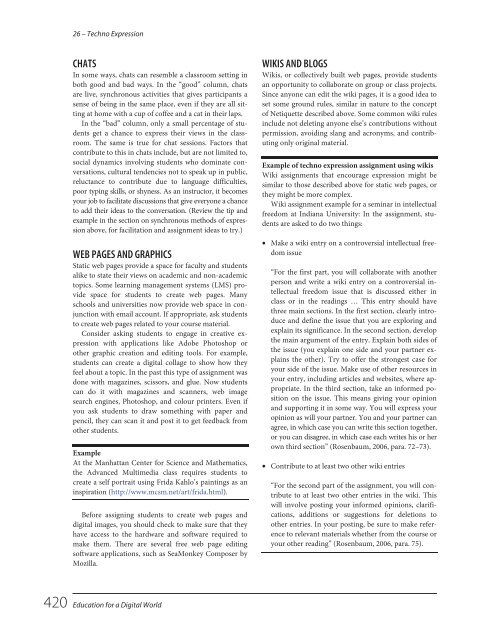Education for a Digital World Advice, Guidelines and Effective Practice from Around Globe, 2008a
Education for a Digital World Advice, Guidelines and Effective Practice from Around Globe, 2008a
Education for a Digital World Advice, Guidelines and Effective Practice from Around Globe, 2008a
Create successful ePaper yourself
Turn your PDF publications into a flip-book with our unique Google optimized e-Paper software.
26 – Techno Expression<br />
CHATS<br />
In some ways, chats can resemble a classroom setting in<br />
both good <strong>and</strong> bad ways. In the “good” column, chats<br />
are live, synchronous activities that gives participants a<br />
sense of being in the same place, even if they are all sitting<br />
at home with a cup of coffee <strong>and</strong> a cat in their laps.<br />
In the “bad” column, only a small percentage of students<br />
get a chance to express their views in the classroom.<br />
The same is true <strong>for</strong> chat sessions. Factors that<br />
contribute to this in chats include, but are not limited to,<br />
social dynamics involving students who dominate conversations,<br />
cultural tendencies not to speak up in public,<br />
reluctance to contribute due to language difficulties,<br />
poor typing skills, or shyness. As an instructor, it becomes<br />
your job to facilitate discussions that give everyone a chance<br />
to add their ideas to the conversation. (Review the tip <strong>and</strong><br />
example in the section on synchronous methods of expression<br />
above, <strong>for</strong> facilitation <strong>and</strong> assignment ideas to try.)<br />
WEB PAGES AND GRAPHICS<br />
Static web pages provide a space <strong>for</strong> faculty <strong>and</strong> students<br />
alike to state their views on academic <strong>and</strong> non-academic<br />
topics. Some learning management systems (LMS) provide<br />
space <strong>for</strong> students to create web pages. Many<br />
schools <strong>and</strong> universities now provide web space in conjunction<br />
with email account. If appropriate, ask students<br />
to create web pages related to your course material.<br />
Consider asking students to engage in creative expression<br />
with applications like Adobe Photoshop or<br />
other graphic creation <strong>and</strong> editing tools. For example,<br />
students can create a digital collage to show how they<br />
feel about a topic. In the past this type of assignment was<br />
done with magazines, scissors, <strong>and</strong> glue. Now students<br />
can do it with magazines <strong>and</strong> scanners, web image<br />
search engines, Photoshop, <strong>and</strong> colour printers. Even if<br />
you ask students to draw something with paper <strong>and</strong><br />
pencil, they can scan it <strong>and</strong> post it to get feedback <strong>from</strong><br />
other students.<br />
Example<br />
At the Manhattan Center <strong>for</strong> Science <strong>and</strong> Mathematics,<br />
the Advanced Multimedia class requires students to<br />
create a self portrait using Frida Kahlo’s paintings as an<br />
inspiration (http://www.mcsm.net/art/frida.html).<br />
Be<strong>for</strong>e assigning students to create web pages <strong>and</strong><br />
digital images, you should check to make sure that they<br />
have access to the hardware <strong>and</strong> software required to<br />
make them. There are several free web page editing<br />
software applications, such as SeaMonkey Composer by<br />
Mozilla.<br />
WIKIS AND BLOGS<br />
Wikis, or collectively built web pages, provide students<br />
an opportunity to collaborate on group or class projects.<br />
Since anyone can edit the wiki pages, it is a good idea to<br />
set some ground rules, similar in nature to the concept<br />
of Netiquette described above. Some common wiki rules<br />
include not deleting anyone else’s contributions without<br />
permission, avoiding slang <strong>and</strong> acronyms, <strong>and</strong> contributing<br />
only original material.<br />
Example of techno expression assignment using wikis<br />
Wiki assignments that encourage expression might be<br />
similar to those described above <strong>for</strong> static web pages, or<br />
they might be more complex.<br />
Wiki assignment example <strong>for</strong> a seminar in intellectual<br />
freedom at Indiana University: In the assignment, students<br />
are asked to do two things:<br />
• Make a wiki entry on a controversial intellectual freedom<br />
issue<br />
“For the first part, you will collaborate with another<br />
person <strong>and</strong> write a wiki entry on a controversial intellectual<br />
freedom issue that is discussed either in<br />
class or in the readings … This entry should have<br />
three main sections. In the first section, clearly introduce<br />
<strong>and</strong> define the issue that you are exploring <strong>and</strong><br />
explain its significance. In the second section, develop<br />
the main argument of the entry. Explain both sides of<br />
the issue (you explain one side <strong>and</strong> your partner explains<br />
the other). Try to offer the strongest case <strong>for</strong><br />
your side of the issue. Make use of other resources in<br />
your entry, including articles <strong>and</strong> websites, where appropriate.<br />
In the third section, take an in<strong>for</strong>med position<br />
on the issue. This means giving your opinion<br />
<strong>and</strong> supporting it in some way. You will express your<br />
opinion as will your partner. You <strong>and</strong> your partner can<br />
agree, in which case you can write this section together,<br />
or you can disagree, in which case each writes his or her<br />
own third section” (Rosenbaum, 2006, para. 72–73).<br />
• Contribute to at least two other wiki entries<br />
“For the second part of the assignment, you will contribute<br />
to at least two other entries in the wiki. This<br />
will involve posting your in<strong>for</strong>med opinions, clarifications,<br />
additions or suggestions <strong>for</strong> deletions to<br />
other entries. In your posting, be sure to make reference<br />
to relevant materials whether <strong>from</strong> the course or<br />
your other reading” (Rosenbaum, 2006, para. 75).<br />
420 <strong>Education</strong> <strong>for</strong> a <strong>Digital</strong> <strong>World</strong>


















